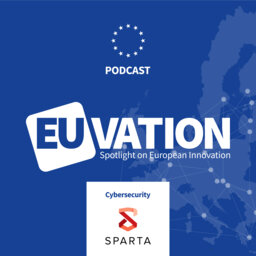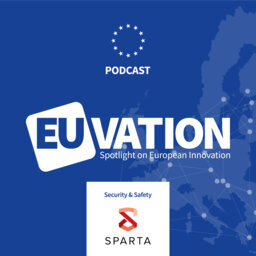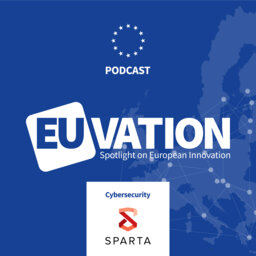SPARTA SPECIAL SERIES (2): An Insiders View of Where Cybersecurity Meets Pandemic (part 2)
SPARTA and COVID-19, Where Pandemic Meets Cybersecurity
In this special series we speak with partners from the H2020 project SPARTA about how the recent COVID-19 pandemic has impacted their work and what si…In this three part series, we look at the SPARTA project in the context of the COVID-19 global pandemic. Why is hacking up, what is the relationship between pandemic and security breach and what are lessons learned so far in SPARTA? These are a few of the topics we discuss.
This project has received funding from the European Union's Horizon 2020 research and innovation programme under grant agreement No 830892.
Hello and welcome to this special Podcast Series which takes a look at cyber security during the time of the COVID-19 pandemic. I'm Peter Balint from Technikon and throughout this three part series we will be speaking with partners from the SPARTA project. In the past we have devoted several podcast episodes to SPARTA and if you recall this project will improve the way cybersecurity is implemented in the EU. From training and education to engaging the development community, SPARTA is committed to implementing lasting changes. Even though cybersecurity and pandemics are not directly related, there are always lessons learned when something has global consequences. Shut down, loss of commerce and public fear are just a few of the effects both a pandemic and a large scale cyber attack could have. In this series we will look at the intersection of these two vulnerable sectors of our society and what is being done on the cyber security side to keep things running safely and securely. Today we speak with SPARTA coordinator, Florent Kirchner. Welcome Florent and tell us what was the first thing to go through your head when you heard we were in Pandemic mode.
Well there is the first thing is you intuitively go back to you know what does that mean to you. You've seen pandemics in movies. We've been fortunate enough and we're working with a generation of people who have been fortunate enough that you know a pandemic at least in the western world is something that we hadn't experienced in a while and the most that we got was the flu pandemic which was very much described as under control. We've heard the scares from Ebola, we heard the scares from SARS, but these never reached our shores, fortunately before so both a question of some kind of disbelief you know. Is this the same thing as SARS and Ebola. This is gonna be terrible for part of the world but this is probably not going to concern us. And at the same time as things grew closer we get to experience with things that previous generations experienced them on a regular basis, but we were fortunate enough not to have to experience already. So discovering this and trying to understand how we react as individuals as groups and as projects it was was something that was challenging to say the least. The initial feedback was okay how do we do this and how do we make sure that everything is safe and secure everyone is safe is secure and that the missions that we are... we've been undertaking as part of SPARTA in particular remain doable one while maintaining the health and safety of everyone. So that was the initial thought. When we got into the pandemic at first. Of course that the second and, we'll get back to this in a minute, but the second issue and the second thing that came to mind was, well okay how does that affect cybersecurity and is there something that we should undertake in the coming weeks? More specifically us as part of SPARTA. What is our role and how you know independently of the missions that were drawn initially at launchtime how do we adapt those missions and how do we contribute to the overall effort?
What was that process like to have to figure out what your role is in this situation? Was this a grueling task or did this come naturally? You're absolutely right in that we've never experienced anything like this before. So how would you rate your response to this pandemic that's upon us?
Well I think it's to be honest I think it's a bit early to rate already. I can tell you how we how we tried to reason about this and the main... our main issue here was that we were torn between two things. The first one is we know that this pandemic has impacts- wide ranging impacts on the security of digital systems. The reason for this we can go into a bit more details in a minute, but we knew that there was there was something at stake here. The second side of the equation and the problem we were facing is we were wondering where was our place. And we tried to also understand that you're part of a greater greater system and that running around flailing your arms and trying to be helpful everywhere can sometimes be counterproductive. So so we got is we we we reached out to a number of stakeholders making sure that they knew that we were available for help. We also made sure that we checked in with the with the product members inside SPARTA to make sure everyone was alright and then brainstormed a few ideas with the people who were interested about how we could ramp up the involvement of SPARTA on a few selected topics. But again trying to proceed with modesty but with a will to to be helpful where we can
And we've sort of been talking about this intersection of cyber security and pandemic where these two things overlap or what they have in common. What what can you say about this?
Well, we were we were talking a bit about this before the recording started Peter - the idea that the pandemic is changing everything. That also applies not only to social relationships but also to how we interact with the world in general. So not only with our peers not only through work not only to our our friends and family but also with with how we work every day with how we shop for groceries with how we we build interactions with our neighbors. And so, and the way they exchange this is because of confinement because the pandemic is forcing us to separate and to isolate we now need... we have no choice but to rely on on digital communication to enable those types of activities whether they are communication activities and exchanges and you've seen the rise of a number of conferencing services videoconferencing conferencing services happen because of this but also all of the all of the the gestures that we're performing every day as part of of our personal life or as part of our professional lives now need to happen in a space where the digital space is the main area of locality. So a few examples when we work on developing solutions and developing code and this is a large part of the work in SPARTA and work of computer science labs as the one that I work in. These gestures now need to happen in cyberspace. They need to do this work needs to happen in cyberspace. So fortunately because of the nature of computer science and software development, a few tools were already available to us but we were very much forced to complement those tools with with with additional means to do the work that we were doing face to face but do it in a remote fashion. Try triaging bugs making sure that we can review code together. We activated a number of the features that that were latent or in existence in some of the tools that we were using because we needed to to to enable those discussions and those that work to to be performed in cyberspace. The second aspect of this and this is something where I'm where I'm still a bit worried about is we need to to have a place where we can have discussions similar to what happens at the watercooler in the real office space. When we can meet and this space with discussion is something that that is especially in in projects such as SPARTA when you need to have... maintain a high level of creativity. These spaces are absolutely key to enabling that level of creativity. You cannot just brainstorm by email and we're still figuring out whether we can brainstorm with the additional tools that we've created and that we've been relying on over the course of the pandemic. So yeah both the core tools of our craft need needed to evolve but also and perhaps most surprisingly at first the the tools that support the informal interactions and everything that makes the salient aspects of research and innovation actions that's the ones that we're undertaking as part.
That was part of my conversation with Florent Kirchner. Tune in next time when we continue our discussion about lessons learned during the pandemic and why hackers may see these uncertain times as an opportunity to do what they do best. For more information about the SPARTA project go to sparta.eu. This podcast has been brought to you by Technikon. The SPARTA project has received funding from the European Union's Horizon 2020 research and innovation program under grant agreement 830892.
 EUVATION: Spotlight on European Innovation
EUVATION: Spotlight on European Innovation






